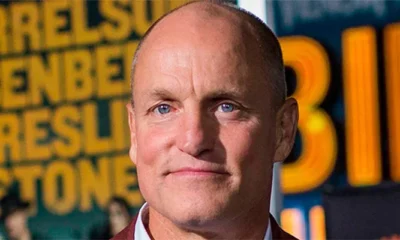News
Becki Newton: The Life and Career of the Talented Actress

Becki Newton’s journey began in New Haven, Connecticut, where she discovered her passion for acting at a young age. With determination and talent as her driving forces, Becki pursued her dreams with unwavering dedication.
Her breakout role as the iconic Amanda Tanen on the hit TV series “Ugly Betty” catapulted her to fame and solidified her status as a rising star in Hollywood. Becki’s impeccable comedic timing and magnetic presence on screen captivated audiences worldwide.
Beyond television, Becki has graced the silver screen with notable performances in films such as “August Rush” and “The Love Punch.” Her versatility as an actress has allowed her to seamlessly transition between comedy and drama with ease.
Off-screen, Becki balances motherhood with her thriving career, showcasing not only her acting prowess but also her admirable work ethic. Through hard work and talent, Becki Newton continues to leave a lasting impression on both the small and big screens alike.
Becki Newton’s Early Life
Becki Newton, the talented actress known for her roles in popular TV shows like “Ugly Betty” and “How I Met Your Mother,” had a humble beginning. Born on July 4, 1978, in New Haven, Connecticut, Becki grew up with a passion for performing arts. From a young age, she displayed a natural talent for acting and knew that she wanted to pursue a career in the entertainment industry.
After completing her education at the University of Pennsylvania, where she studied European History and graduated with honors, Becki decided to follow her dreams of becoming an actress. She honed her craft through acting classes and auditions while working part-time jobs to support herself.
Despite facing challenges early in her career, Becki’s determination and hard work paid off when she landed her breakout role as Amanda Tanen in “Ugly Betty.” This opportunity catapulted her into the spotlight and paved the way for numerous other successful projects in both television and film.
Career
Becki Newton’s career in the entertainment industry is marked by versatility and talent. She rose to prominence with her role as Amanda Tanen in the hit TV series “Ugly Betty,” where she showcased her exceptional comedic timing and acting skills.
After gaining recognition for her role in “Ugly Betty,” Becki went on to appear in various television shows such as “How I Met Your Mother,” “The Goodwin Games,” and “Divorce.” Her ability to effortlessly transition between comedy and drama roles has solidified her reputation as a versatile actress in Hollywood.
In addition to her television work, Becki has also made notable appearances on the big screen, starring in films like “Palm Springs” and “August Rush.” Her engaging performances have captivated audiences and critics alike, further establishing her as a respected figure in the industry.
Throughout her career, Becki Newton has consistently proved herself as a talented and dedicated actress, continuing to take on challenging roles that showcase her range and depth as a performer.
Personal Life
Becki Newton’s personal life is a blend of charm and simplicity. Despite her success in the entertainment industry, she remains grounded and down-to-earth. Off-screen, Becki values spending quality time with her family and friends, often sharing glimpses of her personal life on social media.
Married to actor Chris Diamantopoulos, the couple shares two young children who bring joy and laughter into their lives. Becki’s Instagram showcases snippets of their family adventures and heartwarming moments together.
In interviews, Becki radiates positivity and authenticity. She is known for her witty sense of humor and infectious energy that brightens any room she enters. Beyond the glitz and glamour of Hollywood, Becki finds happiness in simple pleasures like baking with her kids or enjoying a quiet evening at home.
Despite being in the spotlight, Becki Newton remains true to herself, prioritizing what truly matters most – love, family, and genuine connections with those around her.
Filmography
Becki Newton’s filmography showcases her versatility and talent across various genres. From her breakout role as the iconic Amanda Tanen in the hit TV series “Ugly Betty” to guest appearances on popular shows like “How I Met Your Mother” and “The Goodwin Games,” Becki has left a lasting impression on audiences.
In addition to television, Becki has also made notable appearances on the big screen. She starred in movies such as “August Rush” alongside Robin Williams and Freddie Highmore, showing her ability to shine in both comedic and dramatic roles.
Her foray into voice acting includes lending her talents to animated films like “Popples” where she voiced one of the main characters. Becki’s commitment to bringing depth and authenticity to each character she portrays is evident in every project she takes on. With a diverse range of roles under her belt, Becki Newton continues to captivate viewers with her charisma and acting prowess.
Awards and Nominations
Becki Newton, known for her exceptional acting skills, has received recognition in the form of awards and nominations throughout her career. Her talent and dedication to her craft have not gone unnoticed by industry professionals.
Having impressed audiences with her performances, Becki Newton has garnered several award nominations. Whether it be for her comedic timing or dramatic depth, she has proven herself as a versatile actress deserving of accolades.
Amongst the nominations she has received are prestigious awards such as the Teen Choice Awards and Screen Actors Guild Awards. These acknowledgments highlight the impact she has made on both viewers and critics alike.
While she may not have taken home every award she was nominated for, being recognized by these esteemed organizations speaks volumes about Becki Newton’s skill and contribution to the entertainment industry.
Conclusion
Becki Newton is undoubtedly a talented actress who has made her mark in the entertainment industry through her exceptional performances on both television and film. From her humble beginnings to her successful career, Becki’s journey is one of passion, dedication, and hard work.
With a diverse range of roles under her belt, Becki Newton continues to captivate audiences with her charismatic presence and versatile acting skills. Her commitment to portraying complex characters with depth and authenticity sets her apart as a standout talent in Hollywood.
As we look back on the life and career of this remarkable actress, it’s clear that Becki Newton’s star will continue to shine bright for years to come. Keep an eye out for this rising star as she graces our screens with more memorable performances in the future.
News
Remissioning: A Comprehensive Guide to an Emerging Concept

In today’s fast-evolving world, many terms are coined to reflect shifts in technology, business practices, healthcare, and even personal development. One such term gaining attention is “remissioning.” Although not yet widely recognized, remissioning refers to the process of redefining or reassigning a mission—be it in personal growth, corporate strategy, or healthcare. This concept can apply to various fields, including business transformation, life planning, and even recovery in medical terms, where remissioning implies a shift or improvement in one’s health condition.
This article will explore the concept of remissioning in its various contexts, outlining how it plays a vital role in shaping personal goals, business strategies, and even healthcare outcomes. We’ll also address frequently asked questions (FAQs) related to remissioning to clarify its implications and uses.
Remissioning in Personal Development
At its core, remissioning can be seen as a process of redefining one’s personal goals or life mission. In a world that is constantly changing, individuals often find themselves reassessing their purpose, direction, and values. This is especially true during major life events such as career transitions, personal crises, or after achieving a significant milestone.
1. Life Reassessment
When someone has been pursuing a particular career path or personal goal, they might hit a point where the mission no longer resonates. This could be due to burnout, changing personal values, or external factors such as economic downturns. Remissioning in this context involves taking the time to reflect, reassess, and realign one’s personal mission with new objectives that are more fulfilling or practical in the current situation.
2. Adapting to Change
Another scenario where remissioning is useful is during a significant change, such as a midlife career switch, retirement planning, or adjusting after an unexpected event like a health scare or the loss of a loved one. It’s about realizing that a previous mission may no longer be relevant and that it’s time to redefine one’s life goals to adapt to the new reality.
3. Aligning Goals with Values
Many individuals, after experiencing life’s ebbs and flows, often realize that their goals and values are misaligned. For instance, a person who once pursued financial success might decide that personal fulfillment or relationships matter more, prompting them to remission their life’s purpose toward work-life balance, creativity, or community service. This shift requires the process of remissioning—redesigning the map of life based on evolving priorities.
Remissioning in Business
In the business world, remissioning takes on a strategic role, often in the context of corporate restructuring, rebranding, or adapting to new markets. This kind of remissioning reflects a conscious decision to change the company’s mission or strategic objectives to remain competitive, relevant, and profitable.
1. Corporate Remissioning
When businesses face external pressures such as technological disruptions, changing customer demands, or economic shifts, remissioning becomes crucial. It involves reevaluating the company’s mission, vision, and strategic goals, then realigning them to the new market reality. For instance, a business that previously focused on brick-and-mortar retail might remission itself toward e-commerce to keep up with digital trends.
2. Pivoting for Growth
Startups and small businesses often undergo remissioning when their initial business model fails to meet expectations or market demand. Pivoting, a term closely related to remissioning, means redirecting efforts and resources toward a different business mission or strategy. For instance, Instagram originally started as a location-based check-in app before it remissioned into the photo-sharing platform we know today.
3. Cultural and Ethical Shifts
Businesses are increasingly facing demands to address ethical concerns and cultural shifts, such as sustainability, diversity, and corporate social responsibility. Remissioning in this context involves changing a company’s mission to align with these values, ensuring that the company not only remains profitable but also contributes positively to society.
Remissioning in Healthcare
The term remissioning is also relevant in healthcare, where it refers to the process of achieving or maintaining remission from a disease, such as cancer, autoimmune disorders, or chronic illnesses. While “remission” refers to the reduction or disappearance of signs of disease, “remissioning” can be seen as the ongoing process of managing the condition to maintain a state of wellness.
1. Chronic Illness Management
For patients with chronic conditions, remissioning often involves lifestyle adjustments, continuous monitoring, and periodic reassessment of treatment plans. This could involve changing diets, adding or adjusting medications, or engaging in new wellness practices to ensure that the disease remains in remission.
2. Mental Health and Addiction
In mental health and addiction recovery, remissioning involves the process of long-term management after reaching a stable state. For individuals who have overcome depression, anxiety, or substance abuse, remissioning could mean continuing therapy, adopting healthier habits, and adjusting treatment as needed to prevent relapse. The key is recognizing that maintaining remission is an ongoing journey rather than a single achievement.
3. Cancer Remissioning
For cancer patients, remissioning involves a continued focus on health maintenance, follow-up treatments, and regular screenings to ensure that the disease does not return. This process requires active engagement from both healthcare providers and patients to adapt to any new developments and optimize long-term outcomes.
The Role of Technology in Remissioning
Technology has a profound influence on the remissioning process, whether in personal development, business, or healthcare.
1. Personal Development and Life Planning Tools
There are numerous digital tools and apps that help individuals reassess their goals and track their progress. From life coaching apps to mindfulness platforms, these tools allow users to set, track, and adjust their goals in real time, aligning with the concept of remissioning.
2. Corporate Data and Analytics
For businesses, data analytics and AI-driven tools play a significant role in remissioning strategies. By analyzing market trends, customer behavior, and financial performance, companies can make informed decisions about when and how to remission their strategies, ensuring that they remain aligned with evolving market demands.
3. Healthcare and Telemedicine
In the healthcare sector, telemedicine and wearable health devices enable continuous monitoring and adjustment of treatment plans for chronic illnesses. Patients can now remission their health strategies by accessing real-time health data, receiving remote consultations, and adjusting treatments based on insights from these technologies.
Challenges in Remissioning
While remissioning can offer significant benefits, it also comes with its challenges, particularly when it involves deep changes in direction, values, or strategies.
1. Emotional and Mental Strain
In personal remissioning, particularly after a major life event, individuals may face emotional and mental stress as they navigate new goals. It can be difficult to let go of previous aspirations or to admit that a past mission is no longer serving them.
2. Resistance to Change
In a corporate context, remissioning often involves organizational restructuring or a shift in company culture. This can result in resistance from employees, stakeholders, or customers who may be attached to the company’s original mission. Effective communication and leadership are essential in overcoming such resistance.
3. Uncertainty in Healthcare
In healthcare remissioning, there is often uncertainty involved in maintaining remission from chronic or life-threatening illnesses. Patients may feel anxious about potential relapses, and the ongoing adjustments required to maintain health can be taxing both mentally and physically.
Frequently Asked Questions (FAQs) About Remissioning
1. What is remissioning?
Remissioning refers to the process of redefining or reassigning a mission or goal, whether in personal life, business, or healthcare. It involves reassessing and realigning objectives to adapt to new realities, circumstances, or goals.
2. How does remissioning apply to personal development?
In personal development, remissioning involves redefining one’s life mission or goals, often due to major life changes or a realization that previous goals no longer align with one’s values or circumstances. This can include career shifts, lifestyle changes, or personal growth objectives.
3. Why is remissioning important in business?
In business, remissioning is crucial for staying relevant in a rapidly changing market. Companies often need to redefine their mission, strategies, or objectives to adapt to new market demands, technological disruptions, or shifting consumer behaviors.
4. How does remissioning apply to healthcare?
In healthcare, remissioning refers to the ongoing process of managing a disease in remission, such as cancer, chronic illnesses, or mental health conditions. It involves continuously adjusting treatment and lifestyle to maintain wellness and prevent relapse.
5. What are some common challenges in remissioning?
Challenges in remissioning include emotional or mental strain during personal reassessment, resistance to change in corporate remissioning, and the uncertainty of maintaining remission in healthcare. Effective strategies, support systems, and adaptive planning are essential to overcoming these challenges.
6. Can remissioning fail?
Yes, remissioning can fail if the new goals or mission are not well-aligned with one’s circumstances or if there is insufficient planning. In a business context, failure can result from poor market research, while in healthcare, failure could result from inadequate follow-up or care.
7. How can technology help in remissioning?
Technology aids in remissioning through tools such as personal development apps, data analytics for businesses, and telemedicine or health-monitoring devices in healthcare. These tools provide real-time insights, helping individuals or organizations make more informed and timely decisions.
8. Is remissioning a one-time process?
No, remissioning is an ongoing process. Life circumstances, business environments, and healthcare conditions constantly change, requiring continuous reassessment and adjustment of missions and goals.
Conclusion
Remissioning is a dynamic and evolving concept that applies across personal development, business strategy, and healthcare management. Whether you are an individual redefining your life’s purpose, a business adjusting its strategic direction, or a patient managing a chronic illness, remissioning is a vital process of realignment. While it comes with challenges, the ability to reassess and adapt to new realities is essential for long-term success and well-being in a fast-changing world.
News
Meet the Press Season 76, Episode 46: Key Takeaways and Highlights

“Meet the Press,” one of America’s longest-running television news programs, continues to serve as a vital platform for in-depth political analysis and candid discussions with influential figures. Season 76, Episode 46, aired on [date], and featured a range of discussions on current political issues, international relations, and policy debates. Here’s a look at the key highlights and takeaways from this episode.
Featured Guests and Topics
In this episode, “Meet the Press” host [name of the host] welcomed a panel of distinguished guests, including political leaders, analysts, and journalists. The conversation covered several pressing topics, including:
- The 2024 Presidential Election: As the race for the 2024 presidential election heats up, this episode of “Meet the Press” provided a comprehensive analysis of the current political landscape. The discussion focused on the leading candidates from both the Democratic and Republican parties, examining their campaign strategies, policy positions, and public reception. The panel debated the implications of recent polling data and key battleground states that could determine the election outcome.
- Foreign Policy and Global Relations: The episode also delved into the current state of U.S. foreign policy, with a particular emphasis on relations with China and Russia. The guests discussed the ongoing tensions and diplomatic efforts to manage these relationships, including trade negotiations, military posturing, and cybersecurity concerns. The conversation highlighted the complexities of maintaining global alliances while addressing the challenges posed by these major world powers.
- Economic Policy and Inflation: With inflation continuing to be a significant concern for many Americans, the episode featured a detailed discussion on economic policy and the measures being considered to address rising prices. The panel examined the Federal Reserve’s recent actions, the impact of government spending, and potential strategies to alleviate the economic burden on households. The conversation also touched on the broader implications for the U.S. economy, including job growth and wage stagnation.
- Healthcare Reform and COVID-19 Updates: The ongoing debate over healthcare reform was another critical topic in this episode. The guests discussed the state of healthcare in the U.S., including the Biden administration’s efforts to expand access to affordable care and the challenges facing the healthcare system post-COVID-19. The episode also provided updates on the pandemic, including vaccination rates, new variants, and public health strategies to manage potential outbreaks.
- Climate Change and Environmental Policy: As climate change remains a top priority for the Biden administration, this episode featured an in-depth discussion on environmental policy and the challenges of achieving sustainability goals. The panelists explored the impact of recent legislative efforts, such as the Inflation Reduction Act, on renewable energy, carbon emissions, and climate resilience. They also discussed the political and economic obstacles to implementing comprehensive climate policy.
Panel Analysis and Debates
The panel of experts provided a range of perspectives on these issues, reflecting the diverse viewpoints that characterize American political discourse. The debate was particularly lively when discussing the upcoming presidential election, with panelists offering differing opinions on the strengths and weaknesses of the potential candidates. The conversation also highlighted the partisan divides in Congress and the challenges of achieving bipartisan cooperation on key issues such as healthcare, the economy, and climate change.
The analysis of foreign policy was equally robust, with panelists debating the merits of various strategies to manage relations with China and Russia. The discussion underscored the complexities of balancing national security interests with economic and diplomatic considerations.
Key Takeaways
- Election Dynamics: The 2024 presidential election is shaping up to be highly competitive, with both major parties positioning themselves for a contentious race. The episode provided valuable insights into the strategies and narratives that could dominate the election season.
- Economic Uncertainty: The conversation around inflation and economic policy highlighted the ongoing uncertainty in the U.S. economy. With inflation impacting everyday Americans, the episode underscored the importance of economic policy as a central issue in the upcoming election and beyond.
- Healthcare and Public Health: The episode’s discussion on healthcare reform and COVID-19 demonstrated the continued importance of these issues to the American public. As the nation grapples with the aftermath of the pandemic, healthcare remains a critical topic of debate and policy development.
- Global Challenges: The foreign policy segment of the episode reinforced the complexities of navigating international relations in a multipolar world. The discussions around China and Russia emphasized the need for a nuanced approach to diplomacy and national security.
- Environmental Focus: Climate change and environmental policy continue to be pivotal issues, with the Biden administration pushing for ambitious reforms. The episode highlighted the political and practical challenges of achieving these goals amid economic and political constraints.
Conclusion
Season 76, Episode 46 of “Meet the Press” provided viewers with a comprehensive overview of the most pressing political and policy issues facing the United States today. Through insightful analysis and spirited debate, the episode underscored the complexities of the current political landscape and the challenges ahead for policymakers and the American public. As always, “Meet the Press” remains a vital forum for informed political discourse and analysis.
Entertainment
Entertainment Tonight: A Comprehensive Look at TV’s Premier Entertainment News Show

In the landscape of television entertainment news, few programs have made as significant an impact as “Entertainment Tonight” (ET). Since its debut in 1981, ET has carved out a unique niche as the go-to source for the latest celebrity news, behind-the-scenes scoops, and exclusive interviews. This article explores the history, impact, and ongoing evolution of “Entertainment Tonight,” examining why it remains a beloved staple in entertainment media.
1. A Brief History of “Entertainment Tonight”
“Entertainment Tonight” premiered on September 14, 1981, as a groundbreaking show designed to cover the world of entertainment with a focus on celebrity news and Hollywood happenings. Created by Bob Gazzale and produced by the now-defunct Metromedia, the show was envisioned as a nightly news program for the entertainment industry. Its initial format included brief news segments and interviews with stars, setting the stage for what would become a staple of American television.
The show’s first hosts were Mary Hart and John Tesh, who helped establish ET’s tone and style. Hart’s polished presentation and Tesh’s energetic delivery became a defining aspect of the show’s early years. Over the decades, ET has seen numerous hosts and changes in format, but its core mission has remained the same: to deliver the latest and most relevant entertainment news.
2. Format and Features
“Entertainment Tonight” has evolved significantly since its inception, but its core features have consistently drawn viewers:
2.1. Celebrity Interviews
One of ET’s most popular segments is its exclusive interviews with celebrities. The show regularly features one-on-one conversations with top actors, musicians, directors, and other influential figures in entertainment. These interviews often provide insight into the stars’ personal lives, upcoming projects, and industry trends. ET’s hosts are known for their ability to ask probing questions while maintaining a friendly and approachable demeanor.
2.2. Red Carpet Coverage
ET has become synonymous with red carpet coverage. During major events like the Oscars, Grammys, and Golden Globes, ET’s team provides live updates and interviews with stars as they arrive at the venue. This coverage includes fashion critiques, candid moments, and live reactions from celebrities, offering viewers a front-row seat to the glamour of Hollywood.
2.3. Behind-the-Scenes Access
Another hallmark of ET is its behind-the-scenes coverage. The show often features exclusive looks at movie sets, television productions, and music video shoots. This access allows viewers to see the inner workings of their favorite projects and gain a deeper understanding of the entertainment industry.
2.4. Entertainment News and Gossip
ET provides up-to-date news on various aspects of the entertainment world, from box office results to casting announcements and industry rumors. The show is known for breaking news and providing analysis of trending topics. ET’s team of reporters and correspondents ensures that viewers are always informed about the latest developments in Hollywood.
3. The Impact of “Entertainment Tonight”
“Entertainment Tonight” has had a profound impact on both the entertainment industry and popular culture. Here’s a closer look at some of its key contributions:
3.1. Shaping Celebrity Culture
ET has played a significant role in shaping celebrity culture by bringing stars into the homes of millions of viewers. Through its extensive coverage of red carpet events, interviews, and exclusive content, the show has helped define the public personas of many celebrities. ET’s ability to provide an inside look at the lives of stars has contributed to the cultivation of celebrity culture and fandom.
3.2. Influencing Entertainment Journalism
The format and style of “Entertainment Tonight” have influenced the broader field of entertainment journalism. The show’s focus on celebrity interviews, red carpet coverage, and behind-the-scenes access has set a standard for how entertainment news is presented. Many other programs and news outlets have adopted similar approaches, reflecting ET’s impact on the industry.
3.3. Providing Career Launchpads
For many entertainment professionals, appearing on ET can be a significant career boost. The show’s wide reach and influence have helped launch and elevate the careers of numerous actors, musicians, and other celebrities. ET’s coverage can lead to increased visibility and opportunities for those featured on the program.
3.4. Community Engagement
ET has also made efforts to engage with its audience through social media and interactive features. The show maintains a strong presence on platforms like Twitter, Instagram, and Facebook, where it shares updates, clips, and exclusive content. This engagement helps build a community of fans who actively participate in discussions about entertainment news.
4. Evolution and Adaptation
Over the years, “Entertainment Tonight” has adapted to changing media landscapes and viewer preferences. Here’s a look at how the show has evolved:
4.1. Digital Expansion
In response to the digital age, ET has expanded its presence online. The show’s website features articles, videos, and exclusive content that complement the television broadcast. ET’s digital platforms provide additional access to interviews, behind-the-scenes footage, and breaking news, allowing viewers to stay connected even when they’re not watching the show live.
4.2. Diversified Content
ET has diversified its content to appeal to a broader audience. The show covers a wide range of topics beyond traditional celebrity news, including lifestyle segments, health and wellness features, and entertainment industry trends. This diversification helps ET maintain relevance and attract new viewers.
4.3. Changing Hosts and Formats
Throughout its history, ET has seen various hosts and format changes. While the core elements of the show have remained consistent, the hosts and presentation style have evolved. Notable hosts over the years have included Lisa Gibbons, Bob Goen, and Nancy O’Dell. Each host has brought their own style to the program, contributing to its dynamic and ever-changing nature.
4.4. Addressing Social Issues
In recent years, ET has also addressed social issues and cultural trends within the entertainment industry. The show has featured discussions on topics such as diversity and inclusion, mental health, and the impact of social media on celebrity culture. These segments reflect ET’s commitment to staying relevant and addressing important issues within the entertainment world.
5. Behind the Scenes: The Team and Production
The success of “Entertainment Tonight” is attributed to its dedicated team of producers, reporters, and behind-the-scenes staff. The show’s production involves meticulous planning and coordination to ensure that each episode is engaging and informative. Here’s a closer look at some of the key roles involved in creating ET:
5.1. Producers
Producers are responsible for shaping the content of each episode. They work closely with hosts, reporters, and the editorial team to determine which stories to cover and how to present them. Producers also coordinate interviews, manage logistics for red carpet coverage, and oversee the overall production process.
5.2. Reporters and Correspondents
ET’s reporters and correspondents are on the front lines of entertainment news. They conduct interviews, gather information, and provide on-the-ground coverage of events. Their work is crucial in delivering up-to-date and accurate news to the audience.
5.3. Camera and Production Crew
The camera and production crew handle the technical aspects of the show. They operate cameras, manage lighting and sound, and ensure that the production runs smoothly. Their expertise is essential in capturing high-quality footage and delivering a polished final product.
5.4. Editorial Team
The editorial team is responsible for crafting scripts, editing content, and ensuring that each segment aligns with the show’s tone and style. They work to maintain the high standards of journalism and storytelling that ET is known for.
6. The Future of “Entertainment Tonight”
As the entertainment industry continues to evolve, “Entertainment Tonight” faces both challenges and opportunities. The show must navigate changes in media consumption, including the rise of streaming platforms and social media. However, its long history and established reputation position it well to adapt and thrive in the future.
ET’s commitment to delivering engaging and relevant content will likely continue to drive its success. By embracing new technologies, exploring diverse topics, and maintaining its focus on exclusive access and insider knowledge, “Entertainment Tonight” is poised to remain a leading force in entertainment news for years to come.
7. Conclusion
“Entertainment Tonight” has solidified its place as a premier source of entertainment news through decades of dedicated reporting and innovative programming. Its impact on celebrity culture, entertainment journalism, and viewer engagement underscores its significance in the media landscape. As the show continues to evolve, it remains a beloved staple for those seeking the latest in Hollywood and beyond. Whether through exclusive interviews, red carpet coverage, or behind-the-scenes access, ET continues to captivate audiences and provide an insider’s view of the dazzling world of entertainmen.
-

 Games6 months ago
Games6 months agoExploring the Fascinating World of HSNIME
-

 Health6 months ago
Health6 months agoChicken Calories: Exploring Nutritional Benefits and Culinary Versatility
-

 Blog6 months ago
Blog6 months agoUnlocking zVideo: Your Comprehensive Guide
-

 News6 months ago
News6 months agoRai Van: Discover Its Importance In Modern Transportation 2024
-

 Blog6 months ago
Blog6 months agoBlog Arcyart: A Comprehensive and Informative Guide
-

 Fashion6 months ago
Fashion6 months agoYour First Eyelash Extensions Experience Awaits: A Guide to Luscious Lashes
-

 Entertainment6 months ago
Entertainment6 months agoCommunity Speakers: Delivering High-Quality Sound and Long-Term Performance
-

 Business6 months ago
Business6 months agoPrince Narula Digital PayPal: Your Ultimate Guide


